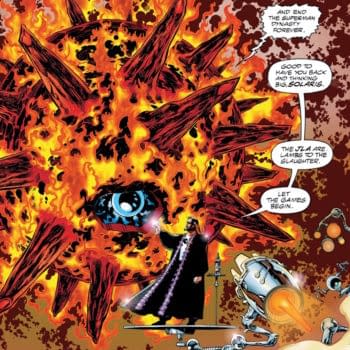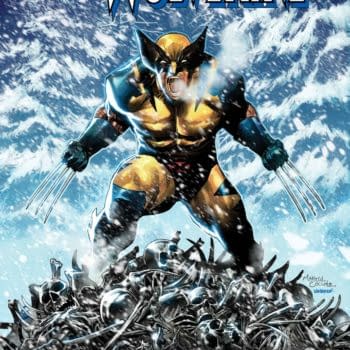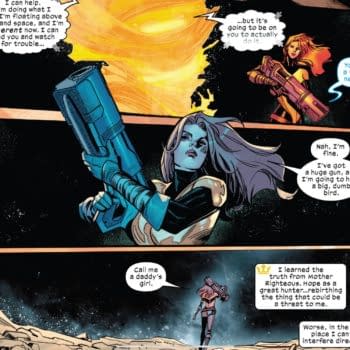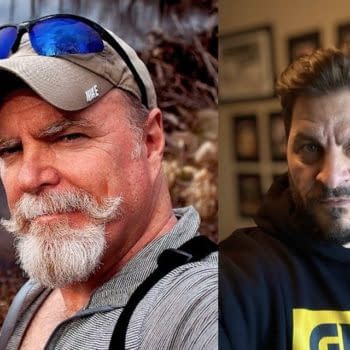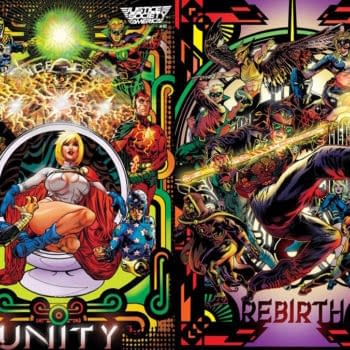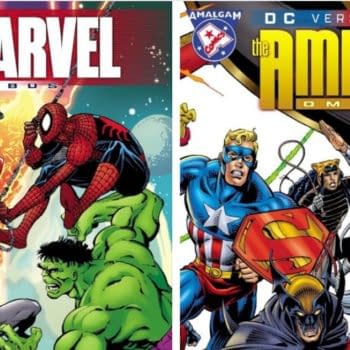Posted in: Comics, Marvel Comics | Tagged: captain america, Christopher Cantwell, marvel, washington times
Captain America and the American Dream in Doubt? Or More Propaganda?
Recently, the conservative newspaper The Washington Times published an article referring to last week's publication of The United States Of Captain America #1 with the headline "Marvel celebrates July 4 weekend by having Captain America say American dream 'isn't real'". Of course, that doesn't actually happen – or it is at the most a wilful misreading of the comic – but this has caused the usual kind of outrage you might expect, including among some folk who should know better. Oh and yes, I'm British, but I really like America and Americans, and I'm currently planning to spend Thanksgiving there this year. Probably should get that out of the way first. Pip pip!

In opposition to the newspaper headline, Captain America doesn't say that the American Dream isn't real, but that dreams aren't real. If the newspaper wants to contradict that statement, we may be in a whole new realm of metaphysics. So what's going on?
The United States Of Captain America comic is a reexamination of the character of Captain America, in the light of the culmination of Ta-Nahesi Coates' run on the series, which concluded last month. It is principally written by Christopher Cantwell, who has been wowing fans over on the Iron Man comic book of late. The comic in question sees Steve Rogers ruminating on Captain America and his place in the country while preparing an old fashion solution to clean and polish his shield. The combination of the two is clearly deliberate. And it refers to a famous Frank Miller Daredevil comic from the eighties where Steve Rogers rejects the government of the day in favour of the "American Dream," thus:
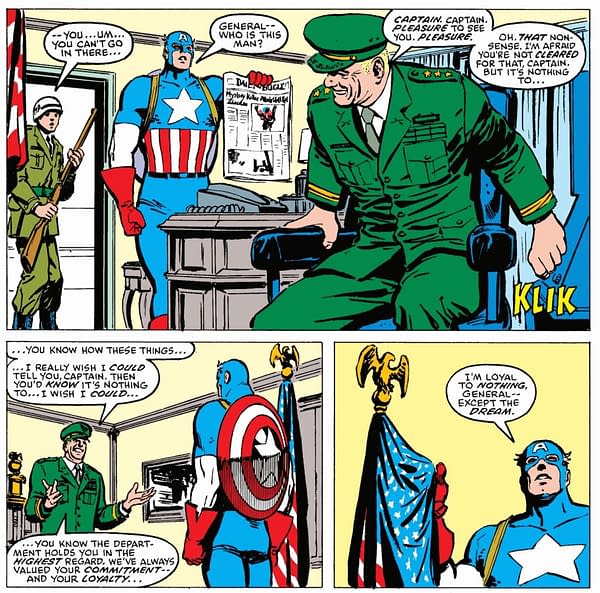
The American Dream is classically an ideal that allows the opportunity for prosperity and success and upward social mobility for family and children, achieved through hard work in a society with few barriers, regardless of social class or circumstances of birth. As a counter, of course, that is seen as an ideal that the country has regularly fallen short of, whether that's slavery, internment, Jim Crow laws, through to the injustices that saw Black Lives Matter marches on the street last year, or the observation that only millionaires get to be President. After all, it is just a dream. But that's the thing about ideals; they are good for helping you get on the right path – eventually. In this comic, Captain America takes apart the different proponents of the American Dream and how it has been used and abused while polishing that shield.

So two dreams for the price of one, and we throw in a lie as well. Break out the vinegar, salt, and baking soda.
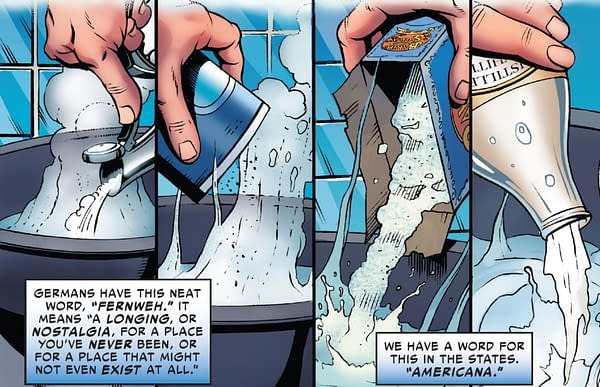
Americana refers to artifacts related to the history, geography, folklore, and cultural heritage of the United States of America and are popular worldwide, especially tied to the forties and fifties, a time before the move for Civil Rights. And superhero comic books, at least traditionally, are part of that Americana.

It's an isolationist approach. And here's the thing – Captain America was born, created by Joe Simon and Jack Kirby in 1939 as a radical opponent to isolationism. In issue 1, he was fighting Adolf Hitler, as a time before the USA entered the Second World War, and was still pursuing an isolationist approach, backed by the country's majority. Joe and Jack got hate mail, got a hate mob, for Captain America Comics #1. But things changed rapidly, and soon Captain America found himself on the right side of history. So what does the American Dream mean to Captain America if not tied up in Americana?

So the American Dream has to apply to everyone – something that is at the core of how it has been expressed, but for centuries kept out of the hands of many by the system, expectations, prejudice, and the status quo. And when the American Dream isn't accessible as it is meant to be, then it's something else.

So this comic has Captain America preaching an American Dream accessible to all, in theory at least, for those who try, not reserved for some, which is at the heart of what it is meant to be.

Rather than Marvel having Captain America say the American Dream isn't real, he says it should be real to everyone. But that wouldn't make as good a headline for the Washington Times or the other media that follow in its wake. And why is Cap thinking about all this now? Because in the comics, the Smithsonian wants his shield for an exhibition. This gives Steve Rogers the chance to reflect on American heroes of all stripes without the cape or the cowl.

While thinking about how various political groups have used Captain America to promote their ideology, whether suitable or bot, which does and has happened in the real world, all the time while Disney is happy to sell Captain America merchandise. And how he's an easy target as well.
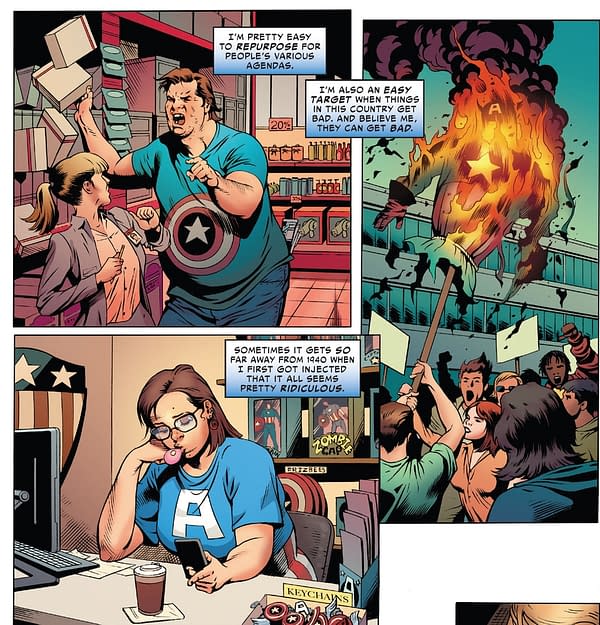
It's almost like his words being repurposed to suit an agenda is exactly what the Washington Times did. Except they chose not to reprint or report on this bit either. Funny that. Anyway, at this point, Cap is attacked, his shield is stolen, kicks off a chase and a battle across the city, and presumably through the series, with all of the symbology that carries. And as Steve Rogers begins to discover how all sorts of people are currently positively reacting to Captain America. When he gets the shield back, maybe this will inspire him to place it in the Smithsonian after all? Because this comic appears to see how the American Dream inspires so many, and in the comic manifested in reflecting the Americana image of Captain America, reclaimed by disparate groups looking for their own icon. And for those who think that this kind of political discussion is too much of a sledgehammer for Captain America, well, he has a history of doing it a lot more, and not just in an inner monologue. Like this. from forty years ago;
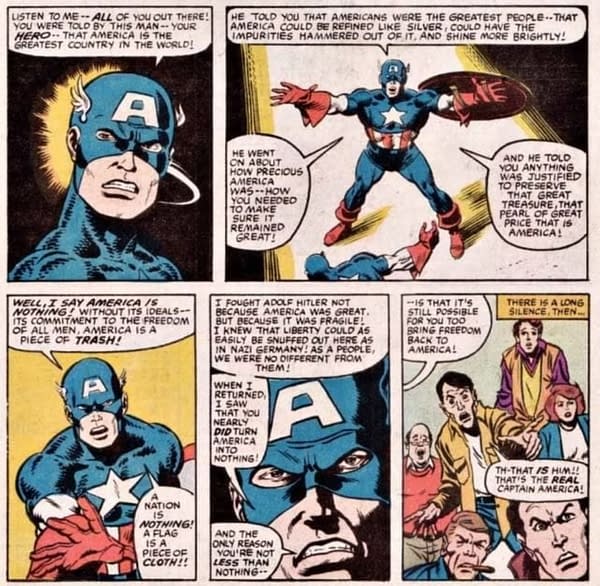
Or from a decade previously, when the President Of The United States was revealed to be the head of a major criminal enterprise, The Secret Empire, playing off Watergate.
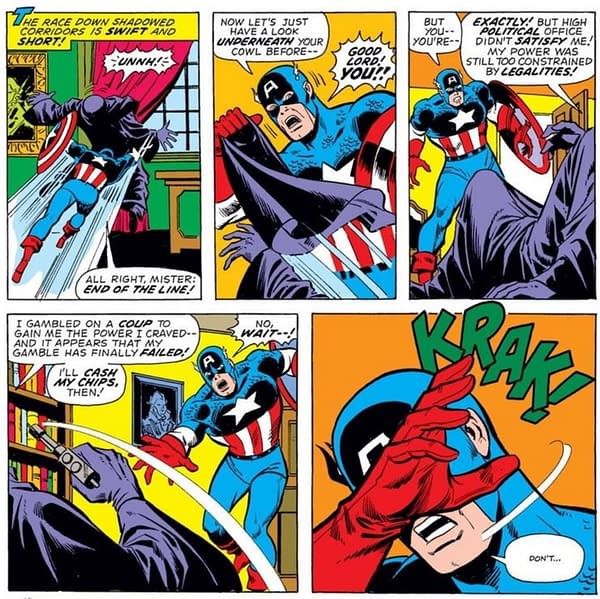
This leads to Steve Rogers to abandon his Captain America identity for some time, unable to feel he could represent an America like this. It's not the only time he'd do this, it became a trope. Though at the time, no one chose to run a headline saying "Marvel Makes Captain America Say America Is A Piece Of Trash" or "Marvel Says That The President Of The USA Is A Head Criminal Who Commits Suicide, Has Captain America Quit." Different times, I suppose, when comic books could tell all sorts of interesting stories and make political points without scaring the horses. It's just weird that people who grew up on these stories now get mortally offended when something similar and, to be fair, more subtle and nuanced occurs now. And look, there's always going to be something weird about a superhero draped in a flag, but at least Captain America repeatedly acknowledges that and examines the consequences. Before hitting someone really hard and throwing his shield in a very cool way as well…






